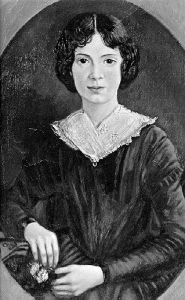My post last week was about letting go of sorrows in order to be happy, and to fully appreciate the good experiences in life. While this is an important stage to come to, it’s certainly not what immediately follows a loss. After the death of a loved one, there is pain, but it is often preceded or accompanied by a kind of numbness. This is the point Emily Dickinson drives homes in her piece, “After great pain, a formal feeling comes —”:
After great pain, a formal feeling comes –
The Nerves sit ceremonious, like Tombs –
The stiff Heart questions ‘was it He, that bore,’
And ‘Yesterday, or Centuries before’?
The Feet, mechanical, go round –
A Wooden way
Of Ground, or Air, or Ought –
Regardless grown,
A Quartz contentment, like a stone –
This is the Hour of Lead –
Remembered, if outlived,
As Freezing persons, recollect the Snow –
First – Chill – then Stupor – then the letting go –
The shock of such a major occurrence as death can often stop us in our tracks. One moment we’re moving through life normally, and the next, we feel frozen, or stuck. This is what the poet communicates with the line, “The Nerves sit ceremonious, like Tombs –” (2); everything becomes completely immobile. And rather than feeling a flood of emotions, we feel nothing: that’s why Dickinson calls the feeling “formal” (1). The heart becomes “stiff” (3) as it processes what has happened. It’s not busy at work beating as usual, because everything has been turned upside down. The passage of time after a loss also becomes questionable in this numb state. It’s often difficult to tell the difference between a minute and an hour. Dickinson acknowledges this, with the query, “‘Yesterday, or Centuries before?’” (4).
The second passage discusses the outward appearance of shock. It’s noticeable to others, as it’s not merely internal, but external as well. Even basic things like walking change: “The Feet, mechanical, go round –/A Wooden way…” (5-6). Life feels like it’s just about going through the motions, like it’s “mechanical.” At the very most, we get “contentment” (9), a contentment that’s heavy, “like a stone” (9), not optimistic.
Dickinson sums everything up in the final stanza. She describes the overall experience that follows the death of a friend or family member as “the Hour of Lead” (10): it’s difficult to get through, but still, it’s only an “hour,” not an eternity. It passes, eventually. The poet believes that if one can survive this stage of grief, if one can “outlive” (11) it, then it will turn into a distant memory. It will be remembered the same way that people who have just gotten away from the snow remember the cold: “First – Chill – then Stupor – then the letting go –” (13). Being outside in the freezing cold isn’t a pleasant experience, but it is something that can be shaken off. The same can be said for numbness and shock; it may freeze us temporarily, put us into a “stupor,” but we are capable of getting through it. We are capable of letting go.
*Top photo credit: picturesofwinter.net
Related Reading Regarding the Passing of a Loved One:
- A biography of the poet
- “‘I’m Not Afraid to Know‘” (SevenPonds)

 “After great pain, a formal feeling comes” by Emily Dickinson
“After great pain, a formal feeling comes” by Emily Dickinson




 Forest Bathing Eases Grief by Soaking in Nature
Forest Bathing Eases Grief by Soaking in Nature
 The Spiritual Symbolism of Cardinals
The Spiritual Symbolism of Cardinals
 Meaning-Focused Grief Therapy: Imaginal Dialogues with the Deceased
Meaning-Focused Grief Therapy: Imaginal Dialogues with the Deceased















This is one of the most accurate depictions of grief that I’ve seen. I also love the analogy to feeling the sting of cold, feeling numb, and then letting go. Thank you for this excellent post and analysis!
Report this comment
Thanks Adrienne for your thoughts. I would agree as to the metaphor of this analysis. I appreciate your visiting us again!
Suzette
Report this comment
Thank you for visiting our blog! We love to hear from our readers and really appreciate your kind comment.
Report this comment
This was a huge help! Thank you!
Report this comment